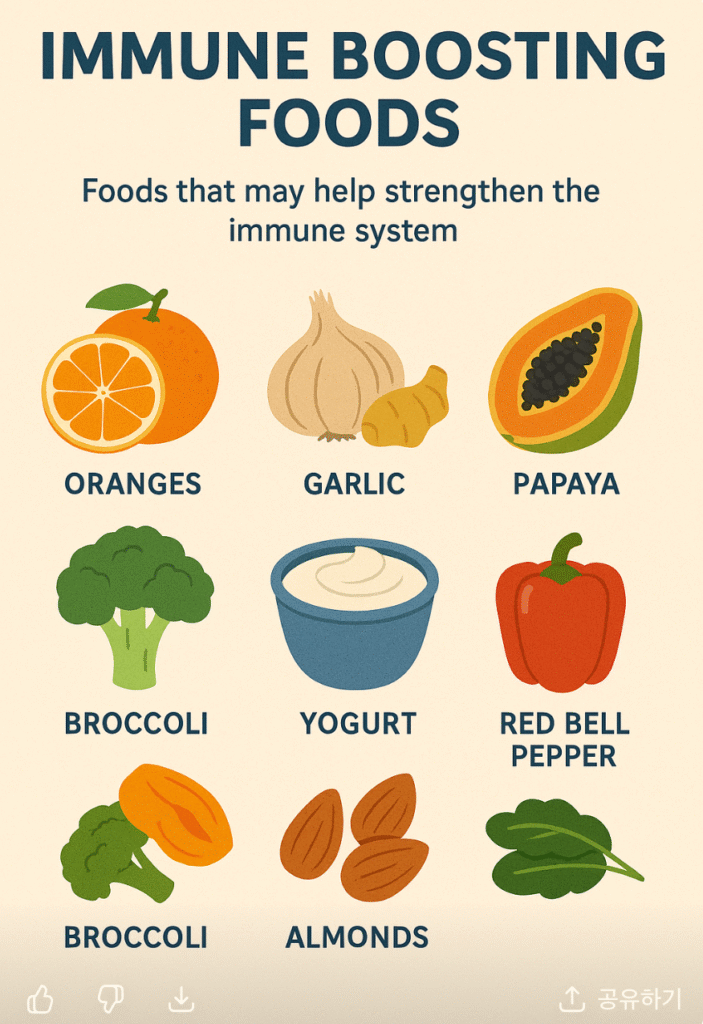Introduction
In an era where health awareness is higher than ever, understanding the connection between nutrition and immunity is essential. The immune system is the body’s natural defense against viruses, bacteria, and toxins. It depends heavily on a steady supply of nutrients — vitamins, minerals, antioxidants, and probiotics — that work together to keep it functioning optimally.
This article explores the science-backed foods that help strengthen immunity, enhance recovery, and reduce the risk of infection, based on evidence from nutrition research and public health guidelines.
Understanding the Immune System
The immune system is a complex network of cells, tissues, and organs that work in harmony to protect the body. It includes:
- White blood cells (lymphocytes and phagocytes) that detect and destroy pathogens.
- Antibodies that neutralize harmful substances.
- The lymphatic system, which filters out foreign particles.
- The gut microbiome, where nearly 70% of the immune system resides.
Nutrition plays a direct role in maintaining immune homeostasis. Deficiencies in key nutrients such as vitamins A, C, D, E, zinc, and selenium can weaken immunity and make the body more susceptible to infections.
Top 8 Science-Backed Immune-Boosting Foods
🥦 1. Broccoli
Broccoli is a powerhouse of vitamins A, C, and E, as well as fiber and antioxidants. It contains sulforaphane, a compound shown to enhance detoxification enzymes and strengthen immune defense.
🍊 2. Citrus Fruits (Oranges, Lemons, Grapefruit)
Citrus fruits are rich in vitamin C, which helps stimulate the production of white blood cells and supports the body’s ability to fight infections. Regular intake can reduce the duration of colds.
🧄 3. Garlic
Garlic’s sulfur-containing compounds, particularly allicin, are known for their antimicrobial and antiviral properties. Studies suggest garlic supplements may reduce the severity of cold symptoms.
🌰 4. Almonds
Almonds provide vitamin E, an antioxidant crucial for protecting cells from oxidative stress. They also contain healthy fats that support the absorption of fat-soluble vitamins.
🍶 5. Yogurt and Fermented Foods
Probiotic-rich foods like yogurt, kefir, and kimchi contain live beneficial bacteria that balance the gut microbiome — a key component of immune health. Probiotics enhance the gut barrier and improve antibody response.
🌶️ 6. Red Bell Peppers
These vibrant vegetables contain nearly three times more vitamin C than oranges and are loaded with beta-carotene, which supports skin and mucous membrane health — the body’s first line of defense.
🫚 7. Ginger
Ginger contains gingerol, an anti-inflammatory compound that supports immune response and helps reduce oxidative stress. It also relieves sore throats and nausea during infections.
🍈 8. Papaya
Papayas are another excellent source of vitamin C and contain papain, a digestive enzyme with anti-inflammatory effects. They also provide folate, vitamin A, and potassium, all of which support immune function.
The Role of a Balanced Diet
No single food can prevent disease, but a diverse, nutrient-rich diet creates the foundation for a strong immune system. The combination of whole foods, lean proteins, colorful fruits, and vegetables ensures an adequate supply of essential nutrients.
Hydration, regular sleep, and stress management also play vital roles in maintaining immune resilience.
Conclusion
Building a strong immune system starts in the kitchen. By incorporating immune-boosting foods such as broccoli, citrus fruits, garlic, and yogurt into your daily diet, you equip your body with the tools it needs to fight infections naturally.
Good nutrition isn’t just about avoiding illness — it’s about creating lasting vitality and balance.
🇰🇷 Premium Korean Ginseng Online Shop







